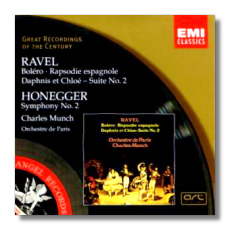
The Internet's Premier Classical Music Source
Related Links
- Latest Reviews
- More Reviews
-
By Composer
-
Collections
DVD & Blu-ray
Books
Concert Reviews
Articles/Interviews
Software
Audio
Search Amazon
Recommended Links
Site News
 CD Review
CD Review
Great Recordings of the Century

- Maurice Ravel:
- Boléro
- Rapsodie españole
- Daphnis et Chloé: Suite #2
- Arthur Honegger:
- Symphony #2
Orchestre de Paris/Charles Munch
EMI Classics 67597 ADD 75:17
The real treat for me on this release was the Honegger. I have this symphony already on DG with Karajan and on EMI with Jansons. Until now, however, the work made little impression on me. Now I know why. The other two conductors have not got the feeling for this music that is needed. Karajan is beautiful; the Berlin Philharmonic is certainly one of the greatest instruments in the world. The more I listened to it, the more I did like it as an alternative to Munch. Karajan and his orchestra give an almost Twilight Zone effect. The problem is that, as usual with Herbert v., the music feels removed from the elements. Like his Sibelius 4th and Prokofieff 5th, it sounds as if we are watching the events through a huge television screen. Jansons is not as aloof from matters. It is intense, perhaps too much so. Too often, as in the first movement, he sounds like he is drawing parallels with Pacific 231. After awhile it got a bit tiresome.
Frankly, the bottom line is that Much has a feel for this music, perhaps because he was French and knew Honegger, that is simply more emotional. I feel a kinship here with Shostakovich's music that the German and Russian conductors miss entirely. Still, if I sense Shostakovich, Honegger has his own accent. One of the things that makes Munch's interpretation "better" are countless little details that he brings out that are just not in either of the other two. For example, the opening has a cello solo that is sorrowful and poignant, but in the other two performances it is barely audible.
My research (notes from discs and Steinberg's book, The Symphony) revealed that Honegger 'had a deep interest in Bach'. I would swear that in the finale of the 2nd he quotes "A Mighty Fortress Is Our God" in an almost Ivesian manner. I have not read this elsewhere and would appreciate readers' reactions. For what it is worth, the notes on this release begin with the Honegger and spend most of the time on it. What this recording has done is open up a whole new sound world to me. I now need to reexamine my opinions about Honegger's music.
The Ravel items are pretty much a known quantity to collectors. If you don't already have a Munch recording of the Boléro, you don't have enough. I recall reading, somewhere, Munch saying that Ravel told him Boléro should last exactly 17 minutes. Now, I no longer recall the source and could be wrong, but this recording is 17:03. (Then, too, the Boston/Munch recording on RCA was around 13 minutes). This recording brings out some lovely woodwind work, but the snare drum(s?) do get a bit incessant. I wonder if this is a problem due to Munch's decision regarding the "relief' or "balance" he wanted. I compared this with Monteux's London Symphony recording on Philips. Monteux takes a little over 15 minutes. I found it less interesting because of details, like the woodwinds, that Munch spends more time on. The slower tempo seems better here. Munch's pace gives the piece a greater sense of inevitability. Interestingly (or maybe not) the notes with the disc barely mention the work and then only near the end. Perhaps the writer doesn't like the piece.
The other Ravel material is lush and wonderful. Perhaps Munch is not as magical as Stokowski, but what do you expect? The ART process has produced an excellent, warm yet detailed, sound. The cover art, from the original LP, reminds me that I once owned this disc. Do I need to say that this disc is a must?
The bottom line is to go back to the top.
Copyright © 2001, Robert Stumpf II


















